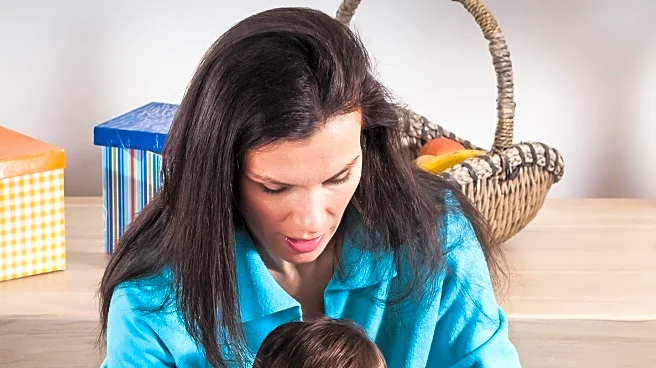What's Happening?
A parenting advice column has addressed a situation where a parent, referred to as 'Involuntary Babysitter,' is dealing with the frequent presence of their child's friend, Kenny, at their home. Kenny, whose
parents are divorced, often visits because his mother works long hours. The parent feels overwhelmed by the unplanned childcare responsibilities, as Kenny is around constantly when not in school. Despite the child's good behavior, the parent desires more family time without the additional presence. The column suggests viewing the situation as an opportunity to provide a safe space for Kenny, while also recommending setting boundaries by specifying acceptable visiting times.
Why It's Important?
This situation highlights the broader societal issue of childcare challenges faced by working parents, particularly single parents. The story underscores the importance of community support systems in providing safe environments for children when parents are unavailable. It also raises awareness about the emotional and logistical strain on families who unexpectedly become part of such informal support networks. The advice given reflects a balance between empathy for the working parent and the need for the host family to maintain their own family dynamics. This scenario is a microcosm of larger discussions about work-life balance and community responsibility.
What's Next?
The advice column suggests that the parent communicate with Kenny's mother to establish specific days and times for visits, allowing her to arrange alternative childcare when necessary. This approach aims to reduce the unexpected nature of Kenny's visits and alleviate the parent's stress. The situation may prompt further dialogue about community-based childcare solutions and the role of neighbors in supporting each other. It also opens up potential discussions on how workplaces can better accommodate the needs of single parents, possibly influencing future policy considerations.
Beyond the Headlines
This story touches on the cultural value of 'it takes a village to raise a child,' emphasizing the importance of community involvement in child-rearing. It also highlights the ethical considerations of balancing personal boundaries with community support. The narrative may encourage other families to reflect on their roles within their communities and consider how they can contribute to or benefit from such informal support networks. Additionally, it may inspire discussions on how societal structures can better support single parents, potentially influencing future social policies.









